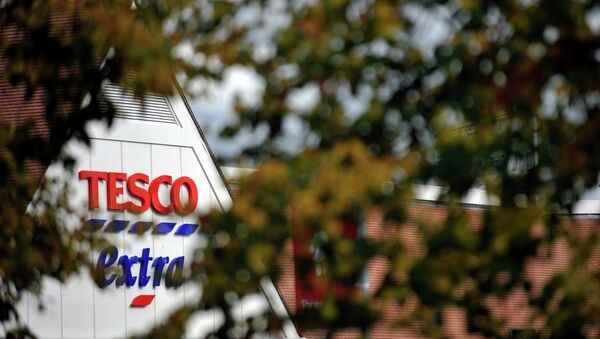The UK grocer, whose share value plunged £2 billion when it announced in September its profits had been overstated by £250 million, has now left hundreds acres across the UK undeveloped, after sitting on land for decades to prevent other retailers opening up stores.
The company – once the market leader that appeared unstoppable – has been hit with strong competition from the likes of Lidl and Aldi and saw its market share fall to 28.8%, down from 30.1%, in the 12 weeks leading to 12 October, 2014.
Tesco closures: Is your local store to go? http://t.co/JnOmz6MVRC pic.twitter.com/68TluupEnw
— Sky News (@SkyNews) January 28, 2015
Its decision not to go ahead with the construction of 49 new stores has left many locals angry that the retailer spent years buying up land – some of it now derelict and an eyesore – aggressively using planning laws to protect the sites for ‘future use’ and has now walked away from using them.
A further 43 existing stories are set to be closed down – costing over 2,000 jobs – and some stores that are yet-to-open have been boarded up, awaiting better times to open.
The move has prompted locals in many towns to question the integrity of the retail giant that – they say – acted big and stamped over planning regulations when it had muscle, but now is retreating, leaving behind it a blotted landscape of empty promises.
History of Flexing Muscles with Planners
As far back as 2006 – and after many years of grabbing land to prevent its competitors from gaining ground in towns where it wanted a stake in the future – Tesco was referred by the Office of Fair Trading (OFT) to the Competition Commission.
Just popped into crossgates @Tesco sorry to hear it's one of the shops closing. Unsurprisingly staff morale low. Good luck to them all.
— Katie Schmuecker (@KatieSchmuecker) January 29, 2015
An investigation by the OFT had found that the retailer was using the planning regime as a “costly barrier to entry, making it difficult for new stores to open and compete with those already in the market”.
The OFT also alleged that Tesco had “significant land holdings which could aggravate barriers to entry or otherwise harm consumers. In some instances, supermarkets have attached restrictive covenants when selling sites”.
In the end, the Competition Commission concluded that – although Tesco was sitting on 4.5 million square metres of unused land – it was not using this land bank to impede competition.
However, the Competition Commission ordered Tesco to end the practice of using restrictive covenants to control how land they had owned was developed after being sold, by imposing conditions that rival supermarkets could not acquire the land. Tesco later admitted it had continued using such planning loopholes, despite the warning.
Environment campaigners Friends of the Earth accused Tesco of “bullying” local planning authorities, when it came to land banks and applications for conversion into shops.
It found “submissions made with supermarket planning applications are often inconsistent or substandard and in some cases inaccurate and misleading. The mismatch between the resources available to supermarkets and local planning authorities give supermarkets an advantage in the planning system and can make it harder for local authorities to challenge inaccurate submissions. Big chains’ ability to offer ‘sweeteners’ to local authorities gives them an advantage over other operators.”
Languishing Local Landmarks
By August 2014, Tesco owned around 310 sites, most bought in the 1990s and 2000s, and adding up to 4.6 million square metres or 1,100 acres – the size of a small city. Many of them were brownfield, ugly sites that remained untouched for years.
Some are even ancient local landmarks, such the former Royal Hospital in Wolverhampton, built by Victorian philanthropists. Tesco has owned the hospital site for 13 years and spent a decade in a bitter legal war with Sainsbury's over the right to build on another site nearby.
In all that time, Tesco only carried out necessary conservation work on the former hospital and it remains a forlorn, wasted historic building.
Pat McFadden, Labour MP for Wolverhampton South East, said the move by Tesco now to scrap the £60 million project was a "betrayal" and proved Tesco was a company that "could not be trusted".
“Less than a year ago the UK managing director of Tesco gave a pledge on behalf of the company that this investment would go ahead in the coming financial year. Now the company has broken its word."
The #supermarket chain announced that 3 stores will close in the #WestMidlands http://t.co/eEueK5jIOi pic.twitter.com/4vSPikdW0J
— Express & Star (@ExpressandStar) January 28, 2015
Dave Lewis, Chief Executive of Tesco said in a statement: “Our business is operating in challenging times. Trading conditions are tough and our underlying profitability is under pressure. We do however face these challenges from a position of market strength and I have been heartened by the team’s welcome and their determination to stay focused on doing the very best for our customers. Whilst my review of the whole business continues, three immediate priorities are clear: to recover our competitiveness in the UK, to protect and strengthen our balance sheet and to begin the long journey back to building trust and transparency into our business and brand.”
Tesco has spent a decade flexing its muscles and using its sheer wealth and weight to bully planning authorities into all sorts of agreements, in order to build up a land bank to prevent its rivals from moving in on its patch.
In doing so, it brought communities promises of new buildings, extra amenities and the chance to improve the landscape.
Now, forced to admit a £250 million hole in its accounts and under criminal scrutiny by the Serious Fraud Office, this consumer colossus is now forced to retreat, leaving thousands of acres of land still blighted and commitments to locals in tatters.




